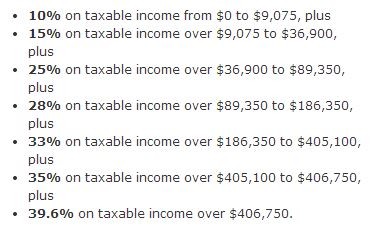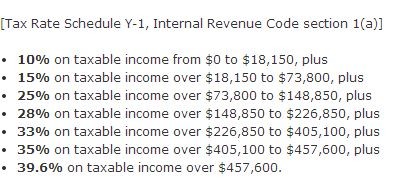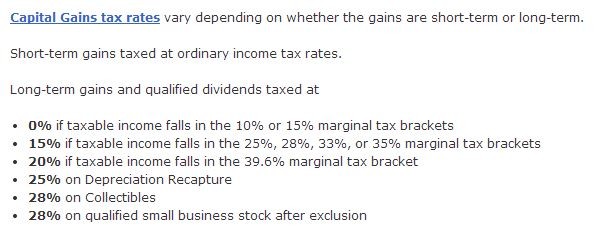2014 Tax Increases- Truth! & Fiction! Depending on the bracket!
Summary of eRumor:
This is a forwarded email that warns that as of January 1, 2014 taxes were raised thanks to the Affordable Care Act, aka “Obamacare”.
Some versions of the eRumor begin with “Happy New Year America.” Other versions say that the tax increases begin July 1, 2014.
The Truth:
According to the website Taxes.About.Com there were changes in the tax rates and brackets. Overall income tax rates are the same but the tax brackets were shifted. Some people depending on where they are in the tax bracket will actually a different percent in taxes than the prior year. An additional 3.8% will be tacked on to certain capital gains reported, applying to a bracket of 200,000 for single tax payers and $250,000 for joint tax payers. Also, many taxes and credits have been added, which we have listed further down the page.
The site has information posted on personal tax rates and tax brackets for 2014. Below are screenshots from that site:

2014 Tax Rates For single tax payers

2014 Tax Rates For Married tax payers filing jointly
Affordable Care Act affecting taxes
According to the Obamcarefacts.com only individuals earning more $200,000 and families earning more than $250,000 will see an increase in taxes.
The Affordable Care Act has an individual mandate which means that those wishing to opt out of health insurance coverage will be taxed a fine for non-enrollment. The fine to be calculated in the 2014 return (due April 15, 2015) is $95 per adult and $47.50 per child (up to $285 for a family) or 1% of the taxable income, whichever is greater. Fines go up for 2015 and 2016.
The 2013 percentage rates were the same as 2014 but the tax bracket range is different.
Single tax payer:
10% on taxable income from $0 to $8,925, plus
15% on taxable income over $8,925 to $36,250, plus
25% on taxable income over $36,250 to $87,850, plus
28% on taxable income over $87,850 to $183,250, plus
33% on taxable income over $183,250 to $398,350, plus
35% on taxable income over $398,350 to $400,000, plus
39.6% on taxable income over $400,000.
Married joint filing tax payers:
10% on taxable income from $0 to $17,850, plus
15% on taxable income over $17,850 to $72,500, plus
25% on taxable income over $72,500 to $146,400, plus
28% on taxable income over $146,400 to $223,050, plus
33% on taxable income over $223,050 to $398,350, plus
35% on taxable income over $398,350 to $450,000, plus
39.6% on taxable income over $450,000.
The affordable Care Act also affects taxes on capital gains. Capital gains of $200,000 for individuals and $250,000 for families are tacked with a 3.8% tax. The Obamcarefacts.com site said, “The 3.8% capital gains tax typically doesn’t apply to your primary residence.”

2014 Tax Rates on Capital Gains from Taxes.About.Com
According to the Internal Revenue Service, “Most relatively simple estates (cash, publicly traded securities, small amounts of other easily valued assets, and no special deductions or elections, or jointly held property) do not require the filing of an estate tax return. A filing is required for estates with combined gross assets and prior taxable gifts exceeding $1,500,000 in 2004 – 2005; $2,000,000 in 2006 – 2008; $3,500,000 for decedents dying in 2009; and $5,000,000 or more for decedent’s dying in 2010 and 2011 (note: there are special rules for decedents dying in 2010); $5,120,000 in 2012, $5,250,000 in 2013 and $5,340,000 in 2014.”
The Obamacarefacts.com site listed the following taxes and tax credits relating to the Affordable Care Act:
ObamaCare Taxes That Most Likely Won’t Directly Affect the Average American
• 2.3% Tax on Medical Device Manufacturers 2014
• 10% Tax on Indoor Tanning Services 2014
• Blue Cross/Blue Shield Tax Hike
• Excise Tax on Charitable Hospitals which fail to comply with the requirements of ObamaCare
• Tax on Brand Name Drugs
• Tax on Health Insurers
• $500,000 Annual Executive Compensation Limit for Health Insurance Executives
• Elimination of tax deduction for employer-provided retirement Rx drug coverage in coordination with Medicare Part D
• Employer Mandate on business with over 50 full-time equivalent employees to provide health insurance to full-time employees. $2000 per employee $3000 if employee uses tax credits to buy insurance on the exchange (marketplace). (pushed back to 2015)
• Medicare Tax on Investment Income 3.8% over $200k/$250k
• Medicare Part A Tax increase of .9% over $200k/$250k
• Employer Reporting of Insurance on W-2 (not a tax)
• Corporate 1099-MISC Information Reporting (repealed)
• Codification of the “economic substance doctrine” (not a tax)
ObamaCare Taxes That (may) Directly Affect the Average American
• 40% Excise Tax “Cadillac” on high-end Premium Health Insurance Plans 2018
• An annual $63 fee levied by ObamaCare on all plans (decreased each year until 2017 when pre-existing conditions are eliminated) to help pay for insurance companies covering the costs of high-risk pools.
• Medicine Cabinet Tax
Over the counter medicines no longer qualified as medical expenses for flexible spending accounts (FSAs), health reimbursement arrangements (HRAs), health savings accounts (HSAs), and Archer Medical Saving accounts (MSAs).
• Additional Tax on HSA/MSA Distributions
Health savings account or an Archer medical savings account, penalties for spending money on non-qualified medical expenses. 10% to 20% in the case of a HSA and from 15% to 20% in the case of a MSA.
• Flexible Spending Account Cap 2013
Contributions to FSAs are reduced to $2,500 from $5,000.
• Medical Deduction Threshold tax increase 2013
Threshold to deduct medical expenses as an itemized deduction increases to 10% from 7.5%.
• Individual Mandate (the tax for not purchasing insurance if you can afford it) 2014
Starting in 2014, anyone not buying “qualifying” health insurance must pay an income tax surtax at a rate of 1% or $95 in 2014 to 2.5% in 2016 on profitable income above the tax threshold. The total penalty amount cannot exceed the national average of the annual premiums of a “bronze level” health insurance plan on ObamaCare exchanges.
• Premium Tax Credits for Small Businesses 2014 (not a tax)
• Advanced Premium Tax Credits for Individuals and Families 2014 (not a tax)
• Medical Loss Ratio (MRL): Premium rebates (not a tax)
For most of the time that Barack Obama has been in the Oval Office, the U.S. Government has not had an approved budget and the business of government has been operating by a series of continuing resolutions.
In February 2014 Defense Secretary Chuck Hagel announced that the military was going to be reduced. This according to a February 24, 2014 article by the Los Angeles Times that said “Congress has already ordered nearly $500 billion in defense spending cuts over the next decade.” The article also said “that the Army would drop from today’s active-duty force of 522,000 soldiers to between 440,000 and 450,000 over the next three years.”
Posted 03/24/14 Updated 8/20/14
